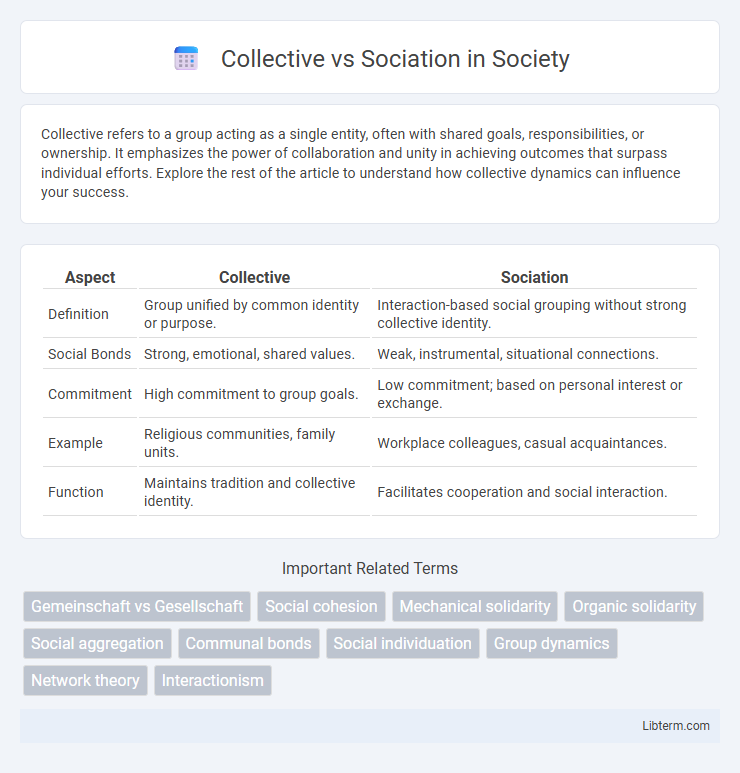Collective refers to a group acting as a single entity, often with shared goals, responsibilities, or ownership. It emphasizes the power of collaboration and unity in achieving outcomes that surpass individual efforts. Explore the rest of the article to understand how collective dynamics can influence your success.
Table of Comparison
| Aspect | Collective | Sociation |
|---|---|---|
| Definition | Group unified by common identity or purpose. | Interaction-based social grouping without strong collective identity. |
| Social Bonds | Strong, emotional, shared values. | Weak, instrumental, situational connections. |
| Commitment | High commitment to group goals. | Low commitment; based on personal interest or exchange. |
| Example | Religious communities, family units. | Workplace colleagues, casual acquaintances. |
| Function | Maintains tradition and collective identity. | Facilitates cooperation and social interaction. |
Understanding Collective and Sociation
Understanding collective and sociation involves distinguishing between types of social bonds; a collective is a group unified by shared interests or goals, often with emotional or ritual solidarity, while sociation refers to associations based on structured, purposeful interactions and social roles. Collectives emphasize emotional ties and a sense of belonging, as seen in crowds or social movements, whereas sociation is characterized by coordinated, rule-governed relationships found in organizations and institutions. Analyzing these concepts aids in comprehending social cohesion and the mechanisms through which individuals connect within societies.
Historical Origins of the Concepts
The historical origins of collective and sociation concepts trace back to early sociological theories where collective referred to groups unified by shared interests or identities, while sociation highlighted the interrelations formed through social interaction. Emile Durkheim and Ferdinand Tonnies significantly influenced these distinctions, with Durkheim emphasizing collective consciousness and Tonnies differentiating Gemeinschaft (community) and Gesellschaft (society) as forms of sociation. These foundational ideas shaped modern understanding of how individuals unite either through inherent bonds or structured social processes.
Key Differences Between Collective and Sociation
Collective refers to a group of individuals who act in unison without structured organization, often driven by shared emotions or spontaneous events, whereas sociation involves stable, organized social relationships based on established roles and patterns of interaction. Collectives are typically temporary and lack formal rules, contrasted by sociations which are enduring and governed by agreed-upon norms or institutions. The key difference lies in the nature of social bonds: collective ties are emotional and impromptu, while sociation is characterized by rational, reciprocal social connections.
The Role of Individuals in Each Structure
In collective structures, individuals contribute as interconnected members whose identities are deeply embedded within the group, influencing and shaped by collective norms and goals. In sociation, individuals maintain distinct identities while engaging in flexible, often voluntary interactions that emphasize personal agency and social roles. The role of individuals thus shifts from being primarily group-oriented in collective contexts to more autonomous and negotiation-based within sociational frameworks.
Social Dynamics in Collectives vs Sociation
Collective social dynamics emphasize shared emotions, unified actions, and spontaneous group behavior, often driven by a common purpose or identity. In contrast, sociation involves structured interactions based on social roles, norms, and reciprocal relationships that facilitate ongoing cooperation and communication. Understanding these distinctions reveals how collectives foster immediate group cohesion while sociation underpins sustained social order and network building.
Collective Identity vs Sociation-Based Identity
Collective identity emphasizes a shared sense of belonging and common purpose within a group, often rooted in historical, cultural, or social ties that foster solidarity. Sociation-based identity arises from ongoing social interactions and networks, highlighting individual roles and relationships within dynamic, organized social structures. The distinction lies in collective identity's focus on emotional cohesion and external group boundaries, whereas sociation emphasizes processual social connections and functional interdependence.
Power and Authority Distribution
Collective structures often distribute power and authority more diffusely, emphasizing shared decision-making and grassroots participation. In contrast, sociations typically centralize authority within formal institutions or leadership hierarchies, ensuring structured control and organized governance. This distinction impacts how influence is exercised, with collectives fostering egalitarian dynamics while sociations prioritize order and formalized power relations.
Impacts on Social Cohesion
Collective actions foster social cohesion by uniting individuals through shared goals and collective identity, strengthening community bonds and mutual support. Sociation emphasizes the patterns of social interaction that create stable relationships and networks, essential for maintaining social order and cooperation. The synergy between collective efforts and sociation processes enhances social cohesion by integrating group solidarity with ongoing interpersonal connections.
Real-World Examples and Applications
Collectives consist of loosely connected individuals engaging in spontaneous, short-term interactions like crowds at concerts or protests, where shared emotions drive behavior without formal organization. Sociations represent structured, goal-oriented relationships seen in work teams, clubs, or online communities, emphasizing sustained collaboration and social roles. Real-world applications of collectives include crowd management and emergency response, while sociations inform organizational development, social network analysis, and community building strategies.
Implications for Modern Society
Collective refers to groups united by shared objectives or common interests, while sociation emphasizes the network of social relationships and interactions shaping individual behaviors. Understanding the distinction influences modern society by highlighting the balance between unified group actions and diverse social connections in shaping social cohesion, identity, and governance. This balance impacts public policy, community development, and organizational dynamics by recognizing the need for both collective goals and complex social ties.
Collective Infographic

 libterm.com
libterm.com